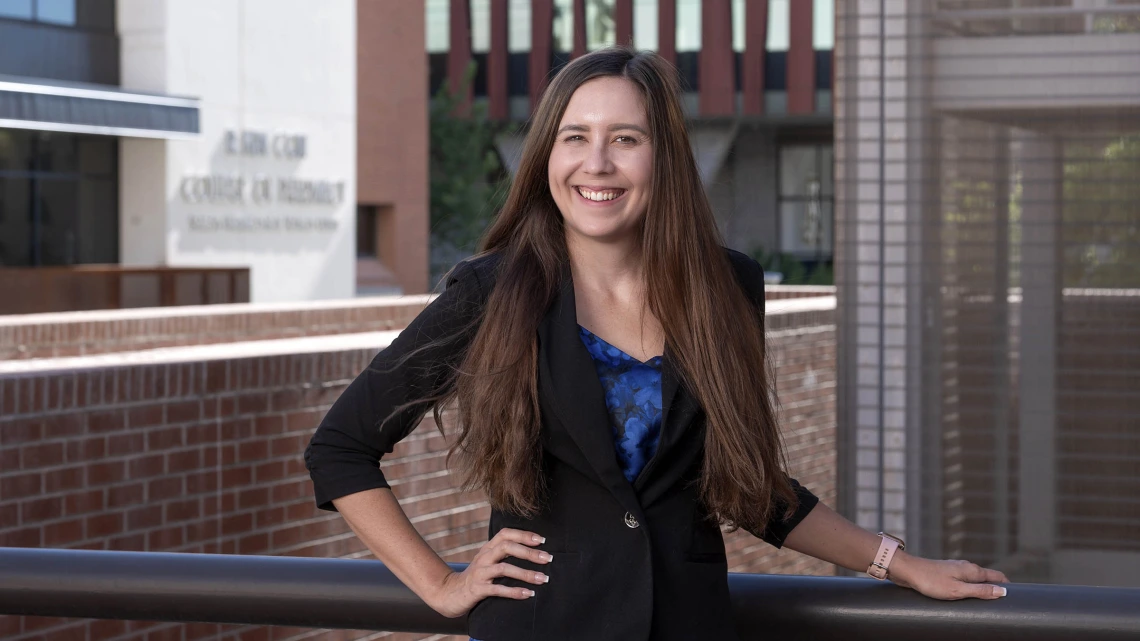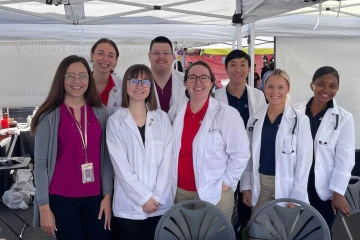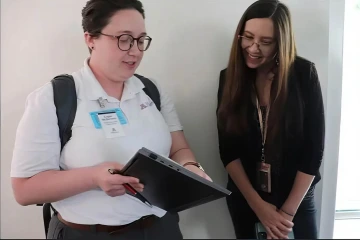Nicole Henry empowering health care from two directions
A friend’s tragic experience with medication interaction led Phoenix educator to pursue career helping others through pharmacology.

From her days as a graduate student to today as an assistant professor of practice at the R. Ken Coit College of Pharmacy, Nicole Henry, PharmD, has stepped up when her community needed her. Whether it was launching a student chapter of the American Society of Consultant Pharmacists or working to ensure her students had awareness of polypharmacy, in which patients are prescribed multiple medications to treat a single condition, Henry finds a way to make an impact.
A passion for health care began early for Nicole Henry, PharmD, an assistant professor of practice at the University of Arizona R. Ken Coit College of Pharmacy. That passion was moved to reality though when tragedy showed her where she could help her community the most.
A career in health care always seemed to be in her future. In high school, she delivered meals to a senior center and volunteered in a hospice program, where she came to know many of the medications the patients were taking. She had the opportunity to attend a pharmacy conference and became even more fascinated by how the interplay of different drugs could produce different results, and how those results could differ from one person to another.
Ultimately, however, it was that tragic event that solidified her choice of career. As an undergraduate bioscience major at Arizona State University, a family friend she’d been helping care for suffered a brain hemorrhage and fall due to a severe interaction between two medications. That friend passed away as a result, and for Henry, his death made clear her way forward: she would pursue pharmacology with a goal of providing medication counseling and education as a pharmacist.
Patient-centered care
After graduating from ASU, she hit the ground running. In 2013 - her first year as a student at the Coit College of

Nicole Henry, PharmD, (left) poses with some of her pharmacy students during a health fair in April 2022 (Courtesy Nicole Henry).
Those early experiences made her realize she could have the greatest impact on the health care system by working for change from two directions – first as a district leader for CVS Health where she is responsible for oversight, hiring, onboarding and talent development and second in teaching the Introduction to Pharmacy Practice course at the College of Pharmacy in Phoenix.
In addition to teaching, she delivers guest lectures in management courses, sharing her expertise and insights as a working pharmacist and industry leader. It’s not a common combination: Of the more than 40,000 physicians, pharmacists, nurses and nurse practitioners that CVS Health employs, Henry alone melds those two worlds.
The perspective from front-line pharmacy has shaped Henry’s teaching to focus on patient-centered care. For example, working with older adults, she has frequently encountered polypharmacy, in which patients are prescribed multiple medications to treat a single condition, such as high cholesterol, high blood pressure or various heart problems. As a professor, she emphasizes the importance of simplifying medication regimens by reducing duplication and exploring combination therapies.
COVID-19 also brought important lessons that inform her teaching. During the pandemic, she helped organize rapid mobilizations of pharmacists, but also witnessed widespread resistance to, and confusion around, vaccines. The experience made her a staunch advocate for improving patient communication and messaging, as well as for everyday issues such as dosing intervals and adherence to a prescribed regimen.
“It’s really about how you communicate with patients to make sure that they understand where you're coming from,” Henry said. “Are we thinking through how patients are going to perceive messaging? Are we creating simplicity so they can truly understand us? I want my students to look at health care through the lens of both the patient side and the business side, because all of it needs to come together for care to be successful.”
“Top of license” pharmacy
Henry argues that pharmacists should be recognized as health care providers at the federal level. Today, each state determines the professional activities allowed for licensed pharmacists, but provider status is a federal legal designation that would dramatically change the national calculus of health care delivery and economics.
For example, pharmacists cannot be reimbursed under Medicare Part B for providing health care services to patients. Nearly every other category of licensed care providers – including audiologists, social workers and dieticians – receive these reimbursements. Champions for federally recognized provider status cite research demonstrating that when pharmacists have greater roles in health care, not only does the overall cost of care decrease, patients have better outcomes and express higher satisfaction.

Henry and Logan McDermott conduct a medication review (Courtesy Nicole Henry)
Expanded roles for pharmacists could also solve problems for the nation’s increasing strain on a too-small workforce of physicians. The Association of American Medical Colleges estimates that the U.S. could face a shortage of more than 120,000 physicians by the end of this decade. When the UArizona Coit College of Pharmacy and College of Nursing recently joined forces to offer a dual-degree program combining the PharmD with advanced nursing degrees, it was partly to help address this looming crisis.
Henry points out that pharmacists are today’s most accessible health care practitioners. A recent peer-reviewed academic study found that roughly 89% of the U.S. population lives within five miles of a community pharmacy, and roughly 97% live within 10 miles of one. Given their extensive training and education, expanding pharmacists’ role in health care delivery could dramatically increase access to routine care. “That ease of care and accessibility – I think that's where pharmacists provide the most value," Henry said.
Coming full circle
Today, Henry’s work has come full circle, even as it continues to break new ground. Where she was once the student organizing consultation clinics at assisted living homes (and throwing them sock-hop fundraisers), she now mentors a new generation of learners into the community to set up clinics and volunteer at health fairs, where they provide free diabetes assessments, cholesterol checks, HIV/AIDS screening, depression awareness education and other services.
“I want my students to look at health care through the lens of both the patient side and the business side, because all of it needs to come together for care to be successful.”
Nicole Henry, PharmD
Nothing in a classroom replaces the practical education that arises in those unscripted, hands-on, real-world settings: critical thinking and problem-solving, but just as importantly learning to listen, relate and build connections. For Henry, it always comes back to patient-centered care: giving people the knowledge and tools to be the agents of their own well-being. There is no greater feeling, she said, than when hearing someone from a clinic tell her, as one recently did: For the first time ever, I feel empowered to ask my doctor questions. I feel empowered because of the work that you and your students have done with me.
"I’m excited about the future of pharmacy,” Henry said. “We can really make a difference for our patients through interventions that are just very, very simple, but first we need to build trust with every patient. They need to know we’re there to provide education to them in a way they can understand and that our job is to make sure that they're safe and healthy and protected.”

